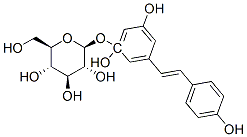| Melting point |
223-226 °C(lit.) |
| alpha |
-55 º (c=1,acetone) |
| Boiling point |
707.7±60.0 °C(Predicted) |
| Density |
1.521±0.06 g/cm3(Predicted) |
| storage temp. |
2-8°C |
| solubility |
DMSO (Slightly), Ethanol (Sparingly), Methanol (Slightly), Water (Slightly) |
| form |
White to off-white solid. |
| pka |
9.31±0.10(Predicted) |
| color |
White to off-white solid. |
| optical activity |
[α]20/D 55°, c = 1 in acetone |
| BRN |
54837 |
| Cosmetics Ingredients Functions |
ANTIOXIDANT |
| InChI |
InChI=1/C20H23O9/c21-10-15-16(24)17(25)18(26)19(28-15)29-20(27)8-12(7-14(23)9-20)2-1-11-3-5-13(22)6-4-11/h1-9,15-19,21-27H,10H2/b2-1+/t15-,16-,17+,18-,19+/s3 |
| InChIKey |
KRZZBNXOOOHROO-ONKCTLKBNA-N |
| SMILES |
C(/C1=CC=C(O)C=C1)=C\C1C=C(O)C=C(O)(O[C@@H]2O[C@H](CO)[C@@H](O)[C@H](O)[C@H]2O)C=1 |&1:17,19,22,24,26,r| |
| LogP |
0.412 (est) |
| CAS DataBase Reference |
65914-17-2(CAS DataBase Reference) |

